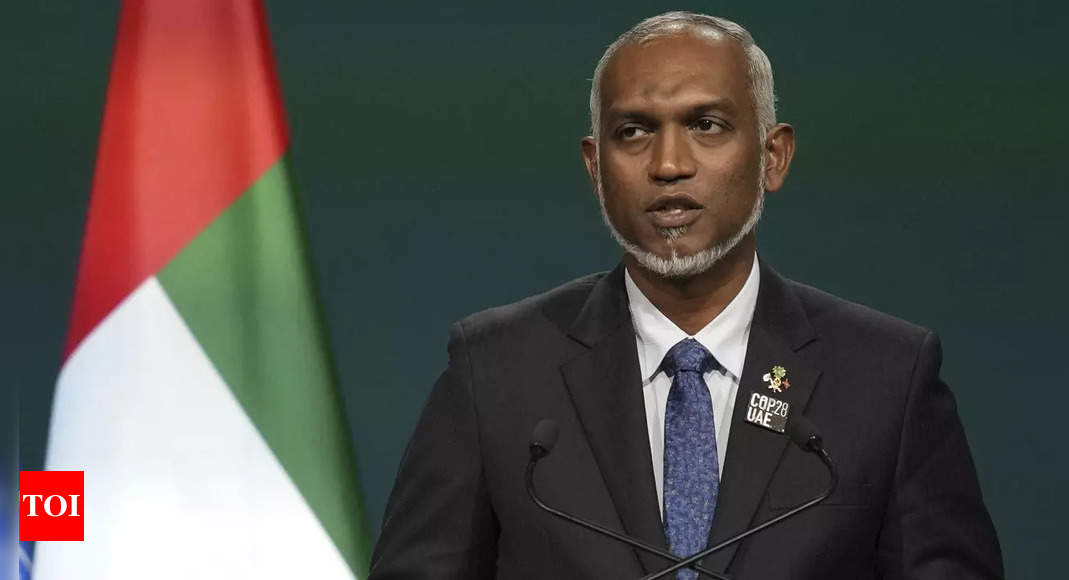[ad_1]
NEW DELHI: The ruling coalition of the Progressive Party of Maldives (PPM) and the People’s National Congress (PNC) used anti-India sentiments and spread disinformation during the 2023 presidential elections, according to a report by the European Union.
The European Election Observation Mission (EU EOM) recently published its final report on the elections that took place on September 9 and 30 last year.
It observed the campaign run by the PPM-PNC coalition for 11 weeks and found that it was based on fears of Indian influences on the country.
Notably, President Mohamed Muizzu, who wrested power from Ibrahim Mohamed Solih, is seen as a “pro-China” leader.
The report said that the PPM-PNC campaign included “derogatory language” directed towards the president and anti-Indian sentiments.
The coalition also raised concerns about Indian influences and the presence of Indian military personnel in the country.
This was clear from the “India Out” campaign run by President Muizzu’s party, which sought to remove Indian military presence from the archipelago.
The report highlighted multiple attempts to spread online disinformation targeting India.
The EU EOM also noted a lack of transparency and effective oversight in political and campaign fundraising and financial expenditure.
The mission observed political partisanship in the media, including public service media, and indications of information manipulation on social media platforms.
Both political camps engaged in negative campaigning, with one side suggesting the return of a repressive PPM government and the other side alleging unfulfilled government promises, corruption and foreign intervention. The presence of Indian military personnel was repeatedly emphasized in these accusations.
In the presidential election, Mohamed Muizzu of the PNC, backed by the Opposition PPM-PNC coalition, defeated the incumbent president Ibrahim Mohamed Solih of the Maldivian Democratic Party (MDP) with 54 percent of the votes.
Chief Observer Nacho Sánchez Amor, Member of the European Parliament, highlighted that the presidential election was well-administered and professionally delivered by the Elections Commission of Maldives (ECM).
However, he also pointed out flaws in the process, including the absence and underrepresentation of women in politics and the widely acknowledged practices of vote-buying and instrumentalisation of public office, which undermined equity and fairness in campaigning.
The EU EOM report provides 20 recommendations to improve future elections in the Maldives. These include fact-checking initiatives to combat misinformation and measures to promote greater representation of women in leadership positions in public and political life.
The report comes in the backdrop of the ongoing diplomatic row between Maldives and India after some ministers from the Muizzu administration made derogatory remarks against Prime Minister Narendra Modi.
The ministers were promptly suspended by the Maldives government, which also distanced itself from their remarks. However, the controversy triggered a boycott campaign online with Indians making a strong pitch for local tourist destinations like Lakshadweep.
India also summoned the High Commissioner of Maldives over the issue.
(With inputs from PTI)
The European Election Observation Mission (EU EOM) recently published its final report on the elections that took place on September 9 and 30 last year.
It observed the campaign run by the PPM-PNC coalition for 11 weeks and found that it was based on fears of Indian influences on the country.
Notably, President Mohamed Muizzu, who wrested power from Ibrahim Mohamed Solih, is seen as a “pro-China” leader.
The report said that the PPM-PNC campaign included “derogatory language” directed towards the president and anti-Indian sentiments.
The coalition also raised concerns about Indian influences and the presence of Indian military personnel in the country.
This was clear from the “India Out” campaign run by President Muizzu’s party, which sought to remove Indian military presence from the archipelago.
The report highlighted multiple attempts to spread online disinformation targeting India.
The EU EOM also noted a lack of transparency and effective oversight in political and campaign fundraising and financial expenditure.
The mission observed political partisanship in the media, including public service media, and indications of information manipulation on social media platforms.
Both political camps engaged in negative campaigning, with one side suggesting the return of a repressive PPM government and the other side alleging unfulfilled government promises, corruption and foreign intervention. The presence of Indian military personnel was repeatedly emphasized in these accusations.
In the presidential election, Mohamed Muizzu of the PNC, backed by the Opposition PPM-PNC coalition, defeated the incumbent president Ibrahim Mohamed Solih of the Maldivian Democratic Party (MDP) with 54 percent of the votes.
Chief Observer Nacho Sánchez Amor, Member of the European Parliament, highlighted that the presidential election was well-administered and professionally delivered by the Elections Commission of Maldives (ECM).
However, he also pointed out flaws in the process, including the absence and underrepresentation of women in politics and the widely acknowledged practices of vote-buying and instrumentalisation of public office, which undermined equity and fairness in campaigning.
The EU EOM report provides 20 recommendations to improve future elections in the Maldives. These include fact-checking initiatives to combat misinformation and measures to promote greater representation of women in leadership positions in public and political life.
The report comes in the backdrop of the ongoing diplomatic row between Maldives and India after some ministers from the Muizzu administration made derogatory remarks against Prime Minister Narendra Modi.
The ministers were promptly suspended by the Maldives government, which also distanced itself from their remarks. However, the controversy triggered a boycott campaign online with Indians making a strong pitch for local tourist destinations like Lakshadweep.
India also summoned the High Commissioner of Maldives over the issue.
(With inputs from PTI)
[ad_2]
Source link


